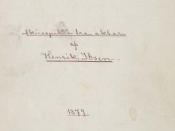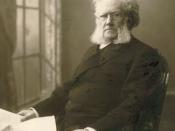Literary critics have long been drawn to the tragedy, yet for a long time these stories only took place in the past. Henrik Ibsen "seems to be the only dramatist to have created great tragedy out of a society that can still be called fundamentally modern"ÃÂ (Notham 136). Many feel that he held a constant ambition to write a "modern"ÃÂ tragedy. This would be no easy task when dealing with modern man. This is why modern tragedy will usually affect more than one "tragic hero."ÃÂ In Ibsen's A Doll House the relationship between Nora and Torvald was an imposturous one, which they both contributed to the destruction of through domination, deception, and corruption.
When one thinks of tragedy in the modern world thoughts quickly turn to the struggle of women in society. The character of Nora personifies that struggle. Her entire life she has been economically dependent upon men, first her father then Torvald.
She caters to her husband's "vulnerable ego by appearing economically as well as emotionally dependent"ÃÂ (Baruch 33). Her passiveness opens the doors for Torvald's dominant behavior. He was constantly looking down upon her. He would refer to her as "my little prodigal"ÃÂ(Ibsen969). Katharine Rogers believes that "Torvald's belittlement clothed with affection and his assumption that he monopolizes the judgment and strength in the household are characteristic of husbands, not wives"ÃÂ (Roger 115). Interpretations such as this tend to point to Torvald as the oppressor, while ignoring the enabling tendencies of Nora. Both parties entered to the dependent relationship that lays way to their downfall knowingly. It is not until these issues rise to the surface that there is a problem. While Nora is a victim it is important to consider her late awakening lust for independence, and the affect it had upon the unassuming Torvald. "...


